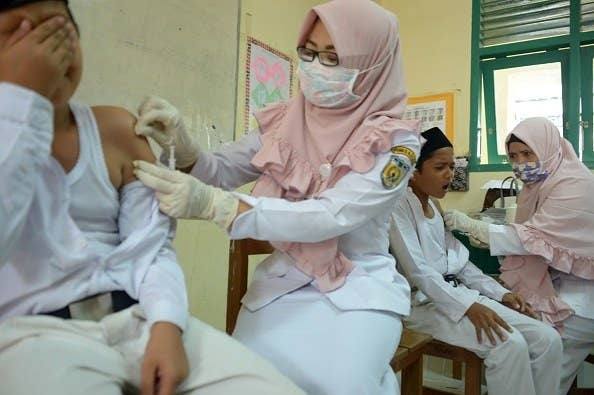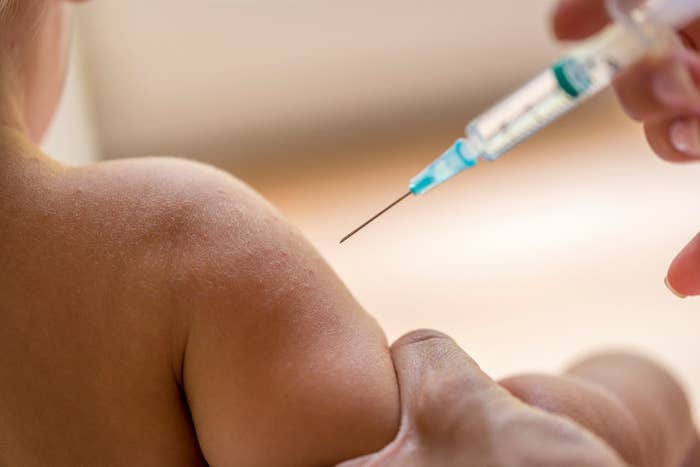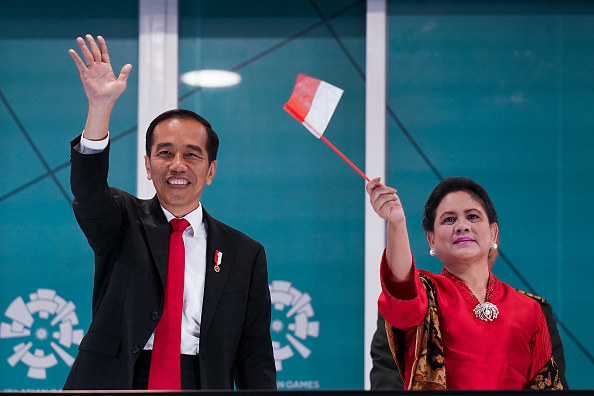
Last week a branch of the most influential Islamic body in Indonesia, the Indonesian Ulema Council (MUI), issued a fatwa against the use of the measles, mumps and rubella (MMR) vaccine because it contains porcine gelatine and is not halal.
In Islam a fatwa is a pronouncement made on the basis of Islamic law and, while not legally binding in Indonesia, it does carry a hefty amount of influence when directed by the MUI (a large state-funded Islamic organisation).
The fatwa was released by the Riau Islands branch of the MUI. While it received support in some areas, it was ultimately overruled by a decision from the central Jakarta body and Ma'ruf Amin. Amin is the chair of the MUI and a candidate for the 2019 Indonesian presidential election.
Following Amin's decision, the MMR vaccine is now considered "mubah" nationwide by the MUI, which means that it is acceptable to use until a halal alternative is available.
The threat to the use of the MMR vaccine is particularly concerning in Indonesia, which has fallen behind the global community in its measles vaccinations and experienced multiple epidemics in recent years.
Measles is one of the leading causes of death among children globally and in 2017 Indonesia experienced over 11,300 confirmed cases of the disease.
For reference, Brazil, which has a population comparable to Indonesia, had no reported cases in 2016 or 2017.
There were also 4,327 documented cases of rubella (German measles) in Indonesia in 2017.
Rubella is a dangerous infection that can cause birth defects or foetus death when mothers are infected during pregnancy.

Dr Dyah Pitaloka, a lecturer in Indonesian studies from the University of Sydney, told BuzzFeed News that any individual's choice to label the vaccine "haram" (religiously forbidden by the Islamic faith) rests on cultural and religious perceptions.
Pitaloka notes that even calling the vaccine mubah leaves Muslim Indonesians in a tricky place, as she says it's best to avoid mubah behaviours as a Muslim, even though they are not technically forbidden.
"Your feet stand in between two lines...it's a challenge," she said.
Dr Amin Hady, the first chairman of the Indonesian Community Council of New South Wales, told BuzzFeed News that this controversy is a cause for concern for Indonesian public health.
"This is what I'm personally worried about — I think some people would take more precaution in using this [the MMR vaccine] while they're waiting or expecting to get the halal [alternative] soon."
Indonesia may be waiting for some time for a halal vaccine.
State-owned pharmaceutical company Bio Farma released a statement in response to the attempted fatwa to assure Indonesians that they are researching to produce a halal MMR vaccine. Corporate secretary of Bio Farma Bambang Heriyanto said that it "could take up to 15 to 20 years to find a vaccine with a new component".
This religious uncertainty comes at an important moment for Indonesian public health.

The Indonesian government is currently in the process of an ambitious nationwide campaign to vaccinate children against measles and rubella.
Over the course of two years president Joko Widodo aims to vaccinate 70 million Indonesian children.
A component of the plan, being undertaken throughout August and September this year, aims to vaccinate 35 million children aged from 9 months to 15 years old, with 2.4 million in the capital Jakarta alone.
The attempted MUI fatwa isn't the first time Islamic groups have fought against vaccines for religious reasons.
There are no halal-certified vaccines manufactured anywhere in the world.
Globally, religious concerns with vaccines account for 10% of the hesitancy to participate in vaccination programs, according to World Health Organisation (WHO) data.
Countries with Muslim-majority populations have experienced outbreaks of vaccine-preventable diseases such as polio, diphtheria, measles, tetanus and pertussis in recent years.
In Pakistan, the religious concerns with non-halal (or haram) have proved to be one of the biggest barriers to polio vaccination and in Malaysia 67% of mothers who refused to vaccinate their children in 2015 attributed this to religious concerns.
Measles outbreaks have been reported in Pakistan, Malaysia, Egypt, Cameroon, South Sudan and Guinea in the past three years.
Islamic concerns with vaccines continue despite a 2003 verdict that was announced by international Islamic Scholars cooperating with WHO that stated vaccines and gelatine medical capsules should be tolerated by observing Muslims.
The report was the result of a convention of more than 100 Islamic legal scholars who agreed that the pork used in vaccines was altered sufficiently from the original animal product that vaccines are permissible for Muslim use.
So, why is it so difficult to produce an Islam-friendly MMR vaccine?
There are two major brands of the MMR vaccine available globally: one is produced by British pharmaceutical company GlaxoSmithKline (GSK) called Priorix and the other is made by the American vaccine manufacturer Merck & Co.
Priorix contains gelatine made from pigs; the Merck & Co. vaccine doesn't use the gelatine but it does use cow products during manufacturing.
Indonesia currently uses an MMR vaccine manufactured in India that contains porcine gelatine. Gelatine is made from pig (or porcine) tendons, ligaments, bones, and cartilage.
The porcine gelatine used in vaccines like the MMR vaccine is a highly purified form that's been broken down into small molecules and it's used as a stabiliser, to make sure that the vaccine remains safe and effective during storage and shipping.
Dr Anita Heywood from the University of New South Wales School of Public Health and Community Medicine told BuzzFeed News that it is difficult to avoid using these non-halal ingredients when making vaccines.
These animal products are not only used as stabilisers, but have to be used as the starting point for vaccine creation.
"You're growing a live vaccine, you need some animal products to be able to grow the virus and so, even at any point during the manufacturing process, they need to use some sort of animal products," said Heywood.
There is also the issue of cost.
The GSK and Merck & Co. products are expensive; Australia uses the GSK vaccine but its price makes it inaccessible to low and middle income countries for their vaccination programs.
Heywood notes that the Australian government does provide the Merck & Co. vaccine that uses only cow ingredients as an option for Jewish and Muslim communities who may find this ingredient more religiously tolerated than pig gelatine.
Heywood says that it may be possible for wealthier Indonesians to privately import the Merck & Co. vaccine but she notes that this special importation is not an option for most Indonesians.
"The mass measles-rubella vaccination program in Indonesia is a free vaccine...It is likely that the Indonesian government has negotiated a price for all Indonesian children and it would not be possible to switch to another vaccine."
Hady believes that for the moment education and further campaigning from the Indonesian government should be undertaken to keep parents enrolled in the vaccination program, regardless of the porcine ingredients.
"It is paramount, I believe, that people should be encouraged to take the injection as soon as it is due."
